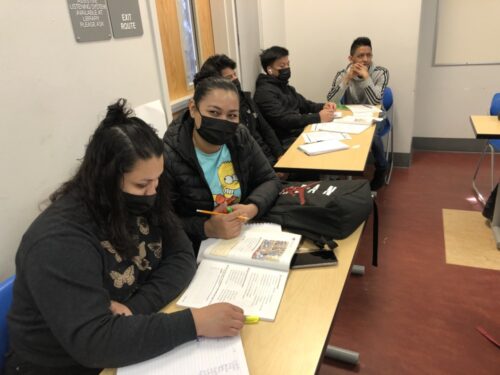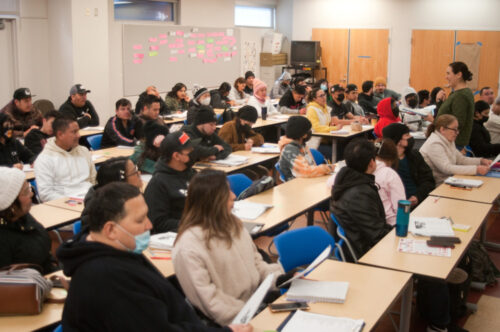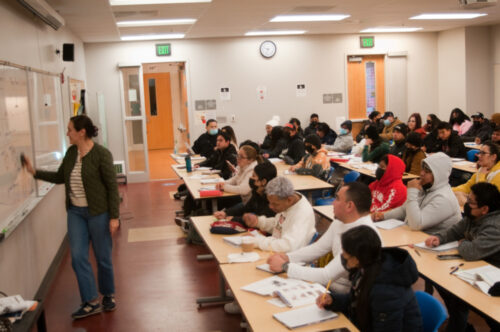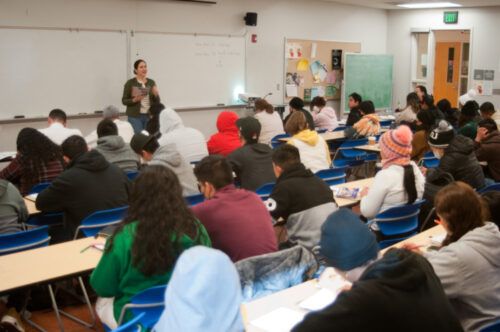Up to 70 students in beginning ESL classes at Mission campus
By Ellen Yoshitsugu
egiese@mail.ccsf.edu
Many beginning noncredit ESL classes at City College’s Mission campus are packed with students, from 40 to 70 students per class, making teaching and learning difficult. City College’s mission to provide ESL instruction to San Franciscans who need it has been undermined by the college’s limited budgets in recent years.
Morning classes in Room 106 at the Mission campus are packed every day. Teachers Patty Gallagher and Lori Admokom single-handedly each lead 50, 60, even 70 students in call and response rote lessons. Students share battered textbooks. It is the same in some, but not all, other Mission ESL classes.
ESL department chair Jessica Buchsbaum said, “There is very strong enrollment and very strong attendance” at Mission campus, adding that at all the ESL program locations that remain open — Chinatown, Downtown and Ocean — attendance is also strong, ranging from 20 to 50 per class. Online classes are also extremely impacted, some with 70 students on Zoom.

“The English language is a lifeline to a new future, to help their families,” said Admokom. The lowest level ESL classes are seeing particularly high numbers of students who have just arrived in the Bay Area.
Not fair to students
Twenty to 25 students would be the optimal class size, said Buchsbaum. Beginning students should have frequent one to one interactions with the teacher but in large classes this is impossible. Admokom estimated that students will take twice as long to advance because they are “just repeating back, parroting, but that’s not real life language use.”
She said that the large classes are only doable because the students are great and want to learn, but that “this should not be the norm for education for anybody.” The students get it but “they don’t like it.”

Student Sandra Lopez said she wants to learn English to get a better job and Ricardo Miranda said that City College’s support for the Latin community is very important.
“As long as there are seats we don’t turn them away,” said Admokom.
But actually the Mission campus has had to close enrollment in some classes when they reached the enrollment cap of 100 students, according to Buchsbaum. The cap is set very high because in non credit classes with open enrollment, not all students attend class every day.
ESL Department funds are limited
Classes are huge because no more sections can be opened. Buchsbaum explained that they are allocated a certain amount of money by the City College Office of Instruction with which to offer classes while balancing the needs of different communities. This is the case for all City College departments.

In previous years, when demand for ESL grew, the college opened new sections until they ran out of classrooms, sometimes even holding classes in the cafeteria, said Carolyn Cox, a 42 year veteran ESL teacher. She said currently there are empty classrooms and recently laid off teachers ready to teach.
Buchsbaum said they have added some sections at Mission this semester, but it’s still very full. “When the college was doing better financially they had the flexibility to augment the budget for a particular program.”
“So how are we going to increase our enrollment if we don’t actually increase the number of class sections?” Buchsbaum asked.
Additional Funding
California funds City College’s non credit programs based mainly on student attendance.
There is extra funding for some noncredit ESL classes designated Career Development and College Preparation (CDCP).
There is also extra funding through a California Adult Education Project (CAEP) grant. Cox said that the students are tested twice in the semester and the school gets money based on their improved scores.
This year the Comprehensive Adult Student Assessment System (CASAS) test was completely online for the first time. Some students were never tested because with the large classes there were not enough computers at Mission campus to test them all.

Need for local programs
Only about 20 of the 120 regularly attending students from the abruptly closed John Adams ESL program are now attending at Mission, according to Kevin Cross, a teacher newly reassigned to Mission.
Student Thanh Nguyen and her husband used to walk 30 minutes to their ESL classes at John Adams; now they have an hour-long bus ride to reach the Mission campus.
Immigrants usually work two to three jobs and sometimes can’t afford transportation, said Admokom. “So if they’re going to take a class, it really has to be close to them,” she continued.

“Mission demand is Mission demand,” said Buchsbaum.
Cross and colleague Diane Wallis have experienced two ESL program closures, first the Civic Center location in 2015, and then the John Adams program in December. They and some of their students have protested, made public comments, and met with Chancellor David Martin, Trustee Alan Wong, and Supervisor Dean Preston, arguing for the re-opening of the John Adams ESL program.
Trustee Solomon responds
“We need to get the data. We need to present the data to show that it’s in fact true that students who would be taking classes are being turned away. And students who would be going to John Adams are now not showing up,” said Trustee Susan Solomon.
Lost students mean lost revenue for the college, she continued, “which creates the potential for a downward spiral.”
“What happened to those students who were in school? [Did] they find another place to go to school or did they simply stop trying?” said Solomon.

Wow! CCSF Need to open more classes for the student! Too much work for teachers and a poor experience for students!
Thanks so much for this thorough and well-written article. As a teacher at Mission Campus, I’m familiar with the huge classes in the unheated rooms, but seeing the photos of packed rooms with students in big jackets, wool hats and scarves trying to see the screen really brought it home.